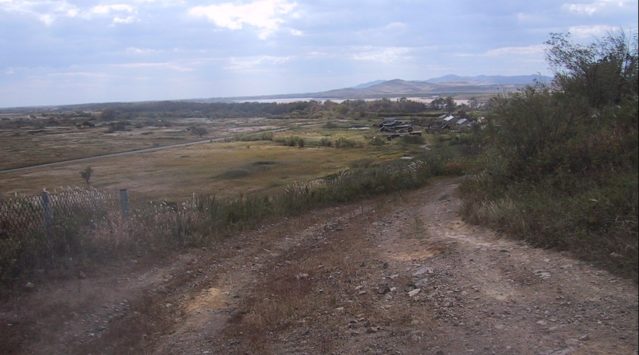Alexander Vorontsov
May 19, 2017
I. INTRODUCTION
In this essay, Alexander Vorontsov shares his concerns about the United Nations imposing an economic embargo on the DPRK and the possible implications for the United Nations.
Alexander Vorontsov is Head of Korea and Mongolia Department, Institute of Oriental studies of the Russian Academy of Sciences, and Associated Professor Oriental Studies Department, MGIMO University
The views expressed in this report do not necessarily reflect the official policy or position of the Nautilus Institute. Readers should note that Nautilus seeks a diversity of views and opinions on significant topics in order to identify common ground.
Banner Image Credit: Tuman River wetlands to left of river and to northern coast, 10 km from Khasan border town; DPRK to south across river. Nautilus staff photo.
II. POLICY FORUM: IS THE UNITED NATIONS AIMING TO DESTROY NORTH KOREA? BY ALEXANDER VORONTSOV
May 19, 2017
As a Korea specialist who visits at annually both North and South Korea where I speak with high-ranking diplomats, among others, I have become more and more disturbed. I would like to share why with the reader.
Last February in Pyongyang, one of the highest-ranking North Korean diplomats said that they surely monitor all election statements of Donald Trump, but judge his intentions not by his words, but by his real actions, his choice of personnel etc. Based on these observations, they were preparing to the period of a very acute confrontation with the new administration immediately in the future. . At the first stage, he indicated, it was unlikely that a direct military collision would occur. But they have concluded that an unprecedentedly long and exhausting embargo is evidently inevitable. They are ready, he indicated, for any scenario and they intend to ensure the ultimate survival of their political and economical system.
Today, it seems that his main theses are being realized.
For example, an impenetrable economic blockade of Pyongyang on the part of numerous non-governmental as well as international organizations is being attempted to create strict sanitary cordon around the national borders of the DPRK with its neighbors, China and Russia, on land and at sea. To ensure the possibility of realizing such unprecedented activities, the US military leadership even requested the US Congress the right to inspect North Korean merchant ships in ports of other countries, including the Russian Federation.
The Korean peninsula is often in a state of high tension. But now Pyongyang has been cast as the sole villain responsible for all this tension. Some of those who make this argument follow it to its logical conclusion, that “Carthage must be destroyed.”
I last saw this lethal situation in 1950 when the United Nations allowed its symbol –the “pigeon of peace” created by the talent of Picasso—to be deployed as a party of war against North Korea.
Recent events remind me of that time. Now, as there were then, there are serious reasons (which are naturally seen in diametrically opposite ways by the contending parties) to escalate a new acute crisis around the DPRK, requiring an “exemplary punishment of a bad guy”.
I am in daily contact with an international network of specialists who study Korea. From this wide circle, I know that I am not the only one frustrated by repeated attempts to use the United Nations to impose a total economic embargo on a 25-million population member state of the United Nations – the DPRK. Never before has the United Nations imposed such an all-out embargo which in the modern world in practice is a form of war without the use of military force. If the UN Security Council starts to punish “bad guy” states with impunity by trying to strangle them, most ordinary United Nations member states may rebel and start to ask questions that challenge the legitimacy of the United Nations itself, or certainly the prerogatives of the UN Security Council.
The question today is why is the United States pushing so hard for such a punitive approach to North Korea? Is it in fact 1950 redux, the goal being to destroy the DPRK?
To me, it’s very simple. Washington wants to force Pyongyang to capitulate before talks begin over various issues, whereas Pyongyang wants to talk on the basis of equivalency.
This stand-off is nothing new. It was the same when the US-DPRK Agreed Framework—something that many American leaders now want to forget about even though it worked well for a time.
And admittedly, the nuclear standoff between the DPRK and the United States and its allies is extremely difficult to resolve and really dangerous if it is not solved.
Everyone wants to resume talks. But it is not possible to insist that one side must capitulate before talks even begin. Talks are only possible when both sides accept that the conditions exist for these talks.
Attempting to talk to someone while strangling them is doomed to fail. No-one can talk when they are being strangled.
III. NAUTILUS INVITES YOUR RESPONSE
The Nautilus Asia Peace and Security Network invites your responses to this report. Please send responses to: nautilus@nautilus.org. Responses will be considered for redistribution to the network only if they include the author’s name, affiliation, and explicit consent.



North Korea must be destroyed. The US must put its nuclear arsenal to good use. Protect American lives!